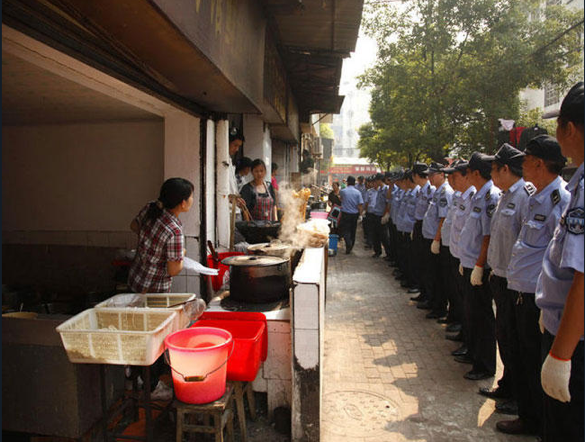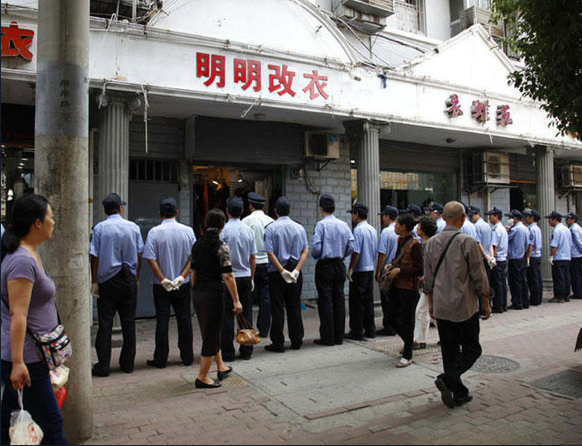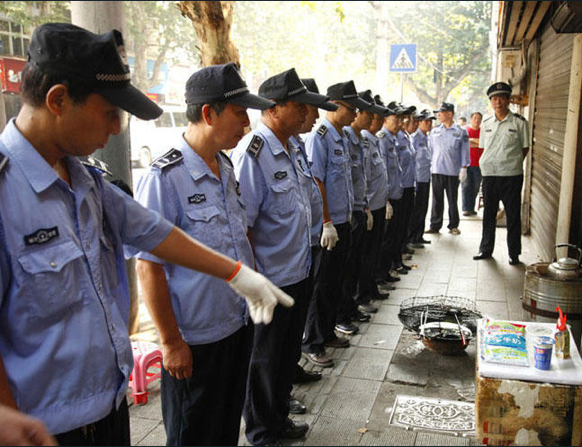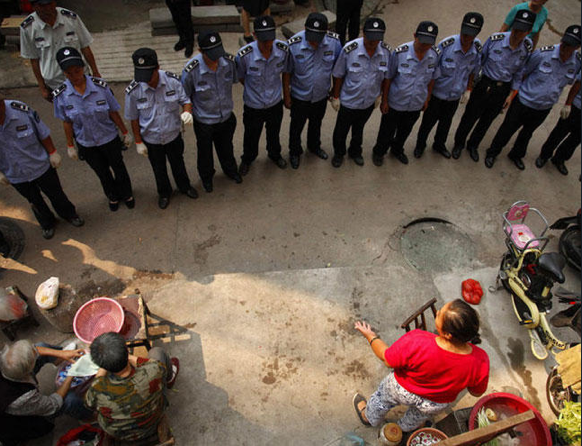Blogs » Society » French “Spiderman” Alain Robert Scales Henan Skyscraper
Blogs » Society » French “Spiderman” Alain Robert Scales Henan Skyscraper |
- French “Spiderman” Alain Robert Scales Henan Skyscraper
- China’s ‘One Child Policy’ Didn’t Create The Aging Demographic Time Bomb–What?
- Kindergarten girl dies in bus, pay more attention to sexual abuse of children in China!
- Mitt Romney's China problem, Ctd
- The Basics Of China HR
- Saturday Night Musical Outro: David Bowie – China Girl
- Anti-Japan Aggression Damages Japanese Brands: But Hurts Chinese People
- Interview: Howard French, Disappearing Shanghai
- DAFF Postponed
- Celebrate Mid-Autumn Festival with these anti-Japan mooncakes, now on sale in Guangxi!
- Chengguan In Wuhan Try A Slightly Different Enforcement Tactic, Still Mocked
- Man Hacks Three Children To Death With “Wood Chopper,” Injures 13 Others
| French “Spiderman” Alain Robert Scales Henan Skyscraper Posted: 22 Sep 2012 08:35 PM PDT Another day, another French daredevil does something in a central China province. We saw rollerman Jean-Yves Blondeau zoom down Hunan province's Mt. Tianmen in July, now it's Alain Robert scaling the world's tallest steel structure, the Central Plains Fortaleza tower in Zhengzhou, Henan province. According to reports, yesterday Robert climbed to a platform 268 meters up on the 388-meter structure, taking about two hours. You know how we have a huge list of phobias to describe irrational tics of the human psyche? What about the opposite — the equally irrational desire for risk. There's no reason acrophilia or aeroacrophilia shouldn't be in the dictionary. Youku video for those in China after the jump. |
| China’s ‘One Child Policy’ Didn’t Create The Aging Demographic Time Bomb–What? Posted: 22 Sep 2012 04:03 PM PDT It's well known that China's aging population is probably a demographic time bomb. And, the 'one-child policy' is always pegged as the culprit. But, is it? Not according to the BBC's 'Ageing China: Changes and challenges.' According to Cai Yong, a population expert at the University of North Carolina, who was asked by the BBC 'to estimate what the country's population growth would have been without the one-child policy': The Chinese government believes the one-child policy curtailed population growth, and that it prevented 400 million extra births. … His [Dr. Cai's] findings suggest that China's fertility would have declined at a similar rate without the one-child policy and would continue to decline even if the policy was discarded. What? Here's Dr. Cai's explanation: The UN's Population Division and statisticians from the University of Washington developed a set of sophisticated models to predict a country's future fertility based on its fertility change history and fertility trends in all other countries. Applying the same model to China, assuming we only know its fertility history prior to the one-child policy, we can "predict" China's fertility level since. The "predictions" can then be compared with what really happened. China had a remarkable success in fertility reduction in the 1970s, before the introduction of the one-child policy: China's fertility dropped from 5.8 children per woman in 1970 to 2.7 in 1978. The model suggests that fertility would have continued its decline without the one-child policy, and possibly would have declined even faster. This last point seems to be counterintuitive, but one explanation could be that the policy caused anxiety among the population, which prompted many to have children at an earlier time. There was a decline in age at first marriage and age at first childbearing in the 1980s. Many exemptions to the one-child policy are made depending on location, job and the sex of your first child. Families who are not subject to any exemption can, if they can afford it, pay the fine for breaking the one-child rule and have more children. However, the policy took a toll on many families. Critics point to the measures taken to ensure its implementation, including forced abortions, sterilisations and sex-selective abortions, which have skewed China's sex ratios; the latest census figures suggested nearly six boys were born to every five girls. Fertility decline is a global phenomenon: most developing countries experience fertility reduction without any draconian governmental measures. If this is correct (for me still a big if), then China's leaders have created a lot of unnecessary grief for its people–and taken the wrap for a time bomb that would have been assembled anyway. |
| Kindergarten girl dies in bus, pay more attention to sexual abuse of children in China! Posted: 21 Sep 2012 06:07 PM PDT Jacky Huang | September 21st, 2012 From Weibo and other sources:
The following news triggered public outcry over sexual abuse of Children in China, as these incidents continued to appear in the new. Recently another outrageous kindergartener sexual assault case happened in Tianjin. However, the police determined the little girl died of suffocation (in a closed bus). We must pay more attention to sexual abuse of children girls in China.
In the morning of Aug 28, 3-year-old little girl, Qingqing (alias) got on the shuttle bus to go to her kindergarten. But when her parents saw her again in the afternoon, she had already stopped breathing, her scared body was covered with someone else's clothes. The police said that she died of heat stroke when she was left inside the bus accidentally by her teachers. But her parents could not accept this because the lower part of her body had blood which indicated sexual assault. The father, Xu Shengwei could not believe what he saw, "She was naked, with her underwear on backwards and scars in her face and body. There were also seven or eight holes in her chest." The most difficult for them to accept is that the child's lower body had blood, seemingly suffered from sexual assault. Heat stroke or sexual assault? That night Little Qingqing's body was taken to the police station for final check. According to the police, Little Qingqing arrived at kindergarten at approximately 8 am but was left on the bus by the teacher on duty. 7 hours later when the teacher found out she was missing and hurried back to the bus only to find Qingqing was already dead. The outdoor temperature that day was 33℃. Little Qingqing could not breath in the sealed and heated bus and died of stroke. As to blood on her lower body, the autopsy report says her hymen was damaged 4-5 centimeters. The police also told them that the shuttle driver admitted indecent act towards Qingiqing on the bus, but he only "touched" her, so it's not the direct cause of her death. "How can that be a heat stroke?" said the father, because the legal medical expert told them Little Qingqing was dead before noon. That means she was alive in the bus for only three hours. The father could not believe three hours of heat can kill a girl. Yesterday afternoon, the reporter contacted Tianjin Public Security Bureau, Xiqing Branch. Deputy Director, Sun said, the case was already solved, including the driver, kindergarten principal, and two teachers were in the bus were detained as suspects of the crime. "Qingqing was the third child who got on the bus, at that time two teachers were getting other kids in the market." Sun said, suspect, the 57-year-old driver, sexually molested Qingqing while the teachers were not on the bus. Police inferred Qingqing, out of fear, was hiding on the bus and forgotten by the teacher. Deputy Director Sun denied the possibility of sexual assault because there were two teachers and nineteen children in the bus, the driver would have no chance of committing it. As for scars Sun explained that the temperature was relatively high that day, the child's skin was more delicate so they were just damage of sunburns. "The driver acted indecently, and teachers' negligence are subject to legal sanctions." |
| Mitt Romney's China problem, Ctd Posted: 22 Sep 2012 12:39 PM PDT  Mitt Romney's newly released tax-returns for 2011 demonstrate that despite his anti-Chinese rhetoric during the Republican primaries and the US 2012 Election, his family trust readily invested in state-owned and private Chinese companies until it became politically embarrassing for candidate Romney. [ more › ] Mitt Romney's newly released tax-returns for 2011 demonstrate that despite his anti-Chinese rhetoric during the Republican primaries and the US 2012 Election, his family trust readily invested in state-owned and private Chinese companies until it became politically embarrassing for candidate Romney. [ more › ]     |
| Posted: 22 Sep 2012 06:53 AM PDT Just read a great post on China HR by my friend Ben Shobert. The post is wrongly titled, "The Unique Human Resource Challenges in China's Healthcare Market." The post is wrongly titled because the challenges are universal to those doing business in China and are in no way confined to just the healthcare sector. Beyond that though, Shobert nails it. Shobert starts his post by talking about how difficult it is to find good people for China's healthcare industry, to which I say "join the club." He then goes on to set out the six lessons he has gleaned from extensive interviews with healthcare executives on the ground in China on managing China HR. What Shobert calls "six lessons for senior care operators, developers and investors as they build their Chinese businesses" but what I call the basics of China HR. Either way, here goes: 1. Limit the Role of the Expat. Shobert notes that the facilities that have struggled in China have had expats "front and center." He goes on to say that he has yet "to speak with a player in the senior care field who does not wish they could find a local Chinese senior executive or facility manager who 'knew the business." He then notes that the next hope is "to find a good expat who knows China and can navigate the cultural challenges of building an organization up from scratch." But the lesson is that the sooner you can transition to domestic talent, the better as having expats leading your China business in perpetuity "sends a message to your staff about their upward career mobility." Shobert then rightly calls for the following expat-local hiring balance:
Good advice for any industry. 2. Where to Find the Talent Shobert's advice here is to "recruit from several different schools, not all of which are where the best students go. Find out which ones are most adaptable to your model and culture." Not being an HR person myself, I'm just not sure this differs much from just trying to get the best people you can while making sure they will be a good fit for your particular company. 3. A Balanced Compensation System Pay well, but try not to pay the most in your industry. Incentivize your employees. Offer perks and do not underestimate the importance of the annual staff party. Okay, but as an employer, here is my serious question. Do employees in China (or anyone else) really want things like staff parties and company lunches or health club memberships or would they not just prefer the money? Which is going to provide more ROI for a company? Or is it not really an either/or situation? 4. A Clear Ladder to Climb Not surprisingly, "everyone" with whom Shobert spoke "consistently emphasized" the benefit of companies in China providing their employees with "a clear ladder to climb." One interviewee stated you need to "make certain employees understand their upward career path, and always dangle the next carrot in front of them." Shobert than notes something that I too have noted:
5. The Training Quid pro Quo Shobert's fifth lesson, is what he calls the "Training Quid pro Quo" and that is that training and development need to be provided to employees in a way that if the employee leaves the company early, the company gets back at least some of its costs: "A standard model is a ratio-tied pay-back if the employee leaves early – e.g. within 3 months of completion 90% paid back; 6 months 75%; etc. etc." This is actually legal in China and is one of the few (actually the only one that pops into my head right now) instances where a company can seek money back from a departing employee. 6. Build the Facility as Much for Staff as Customers Think about your own people in building your facility:
Being the lawyer that I am, I would add one more thing. Be sure that all of your employees (including your expats) have written and signed employment contracts, in Chinese, and be sure that you have a comprehensive employee manual, in Chinese, explaining company policy and each and every grounds for firing. What do you think? |
| Saturday Night Musical Outro: David Bowie – China Girl Posted: 22 Sep 2012 06:30 AM PDT Keep doing it like you do. We'll be back in a little bit. |
| Anti-Japan Aggression Damages Japanese Brands: But Hurts Chinese People Posted: 22 Sep 2012 06:05 AM PDT Photos: Ray Ally In the past few weeks anti-Japanese sentiment has risen in China, fuelled by the controversy over the Diaoyu Islands. Both China and Japan claim ownership to these uninhabited lands, which have rich deposits of natural resources. There have been protests across the country and many Japanese businesses were attacked and vandalised. Riots even spilled out onto the streets, which is very rare in China. In Beijing, protestors tried to storm the Japanese Embassy and the car carrying the Japanese ambassador was attacked. Although the anger is toward Japan's government, it's Japanese brands in China that have been the focus of the attack. The wave of anti-Japanese feeling has been widely spread across social media through the internet and on Weibo, China's twitter. This Tuesday, was the 81st anniversary of Japan's invasion of China back on 18th September 1931. Many Japanese shops and restaurants closed their doors as a mark of respect and to prevent igniting any further animosity on this dark symbolic day. Our local Japanese restaurant was closed for that day and had hung Chinese flags outside its door. The Canon shop next to my wife's office on Jinbao Street had even removed all its signage and masked out its windows so you couldn't see inside. The growing sense of Chinese nationalism sweeping the country is in part answer to the anti Chinese sentiment from overseas, especially coming from the US over trade issues. But what the protestors and rioters don't realise, or care about, is that Japanese brands in China employ local people. They are mostly run and managed by Chinese and play an important part in the business and social community. Japanese brands have been in China for a long time and enjoy a strong and loyal following across market segmentations. At the low-end consumers aspire to own brands like Sony and Canon, which dominate in electronics and cameras. For the middle classes that can afford cars, Toyota and Honda are favourite and popular brands of choice. While for the young and trendy, brands like Evisu and Bathing Ape represent a cool and urban street style. Japanese products are generally more modern in design, have increased high-tech and innovative features and built to superior standards of quality, service and value. In fact they are the exact opposite of how Chinese consumers perceive most local brands, designed and made in China. With such irrational fears and emotions running high, the only option for Japanese brands is to keep their heads down. While all the time continuing to build relationships with local communities through low-key initiatives. As any big national PR campaign could easily backfire and would only highlight the issue even further. Many Decades ago in the UK, we had a similar problem due the aftermath of World War Two. Most people including my grandparents were strongly against buying Japanese brands. I even remember my mother telling me I could marry anyone, as long as she wasn't Japanese. Lucky I married a Chinese woman, but when I first came to China in 1988 many people in the UK were still confused between Japan and China and couldn't point them out on a map. The anti-Japan mood in England, slowly died out in the 67 years since the war ended in 1945. I think in part, because in the West, we commemorate the date the war ended. This was initially a celebration of the victory over the Japanese, on 15 August 1945, known as VJ Day and the end of the war. Every year since, ceremonies have been held across the world and in London, a member of the royal family lays a wreath at the Cenotaph, the grave of the unknown soldier. Nowadays it's a more sombre event full of remembrance, pride and sorrow. In China it's very different, as every year the country commemorates the start of the Japanese invasion of China. I think this plays a large part in keeping the memory alive and breeding a new generation of young people, who feel anger and resentment to what happened more than 80 years ago. While China continues to commemorate the start of the conflict rather than the end, it makes it harder to forgive. Of course China should never forget the atrocities of the Japanese war, but they should not keep opening up the old wound and reliving it again every year. Sadly, I don't see the situation over the Diaoyu Islands being resolved anytime soon, as there is too much pride, patriotism and historical conflict for China and Japan to both back down on this issue. However, economic relationships between the two countries are also very more important, as trade between them generated US$345 billion last year. So while Japanese brands are being damaged, they may look to take their factories and business elsewhere, which in the long run, will only hurt the Chinese people. |
| Interview: Howard French, Disappearing Shanghai Posted: 22 Sep 2012 03:17 AM PDT  Howard W. French is an associate professor at the Columbia University Graduate School of Journalism. He was the bureau chief of the New York Times' Shanghai office from 2003-08, as part of a 22-year career as a foreign correspondent. His new book, "Disappearing Shanghai", is a photographic exploration of the life of neighborhoods "doomed to imminent extinction" as he describes it, with accompanying poems and essays by novelist, poet and Shanghai native Qiu Xiaolong. Sue Anne Tay of ShanghaiStreetStories caught up with him recently for a quick chat on the book. [ more › ] Howard W. French is an associate professor at the Columbia University Graduate School of Journalism. He was the bureau chief of the New York Times' Shanghai office from 2003-08, as part of a 22-year career as a foreign correspondent. His new book, "Disappearing Shanghai", is a photographic exploration of the life of neighborhoods "doomed to imminent extinction" as he describes it, with accompanying poems and essays by novelist, poet and Shanghai native Qiu Xiaolong. Sue Anne Tay of ShanghaiStreetStories caught up with him recently for a quick chat on the book. [ more › ]     |
| Posted: 21 Sep 2012 09:23 PM PDT |
| Celebrate Mid-Autumn Festival with these anti-Japan mooncakes, now on sale in Guangxi! Posted: 22 Sep 2012 12:59 AM PDT  The recent Diaoyu Islands sovereignty dispute between China and Japan has triggered an unprecedented wave of anti-Japanese protests across China. But as the Mid-Autumn Festival and National Day draw near, China's fenqings (angry youths) have found an even more creative way to express their anti-Japanese fervor while enjoying the 8-day holiday. [ more › ] The recent Diaoyu Islands sovereignty dispute between China and Japan has triggered an unprecedented wave of anti-Japanese protests across China. But as the Mid-Autumn Festival and National Day draw near, China's fenqings (angry youths) have found an even more creative way to express their anti-Japanese fervor while enjoying the 8-day holiday. [ more › ]     |
| Chengguan In Wuhan Try A Slightly Different Enforcement Tactic, Still Mocked Posted: 22 Sep 2012 12:00 AM PDT When beating, bullying, and plundering doesn't work, resort to mass intimidation. Urban enforcement officers in Wuhan, Hubei province are turning to the group silent treatment to smoke out "illegal" street vendors. As Caijing reports, "A new policing method is to appear in a straight line and approach illegal business operators wordlessly for maximum intimidation." How well is this policy working? "The application of the tactic has been met mostly with derision. One shop owner said, 'They encircle our shop, but no one else had thought we had done anything illegal. Their style of law enforcement is too harsh.'" I'm imagining one of those chengguan nervously looking to his left and to his right, then stepping forward and being like, "Hey, um. So how much for a jianbing?" More pictures after the jump. (H/T Free More News) |
| Man Hacks Three Children To Death With “Wood Chopper,” Injures 13 Others Posted: 21 Sep 2012 10:15 PM PDT Prepare your horrified face. Yesterday at 2 pm in Nanning, Guangxi Zhuang AutonomousRegion, a man wielding a wood chopper burst into a residence and slashed 16 children in noon care, according to Xinhua. Three died in the hospital. The suspect, surnamed Wu, is in police custody. More details as they become available. Photos below (slightly graphic) via Xinhua link above: |
| You are subscribed to email updates from Update » Blogs » Society To stop receiving these emails, you may unsubscribe now. | Email delivery powered by Google |
| Google Inc., 20 West Kinzie, Chicago IL USA 60610 | |











Comments